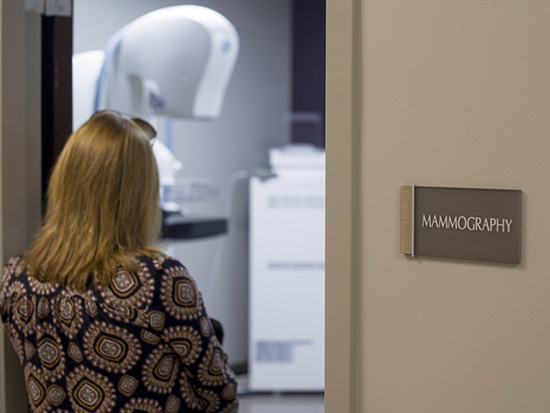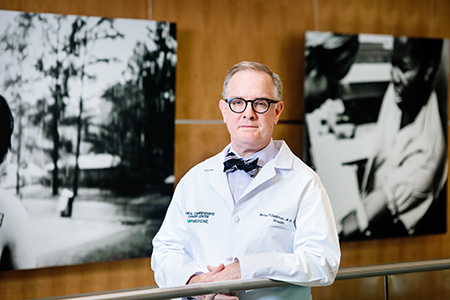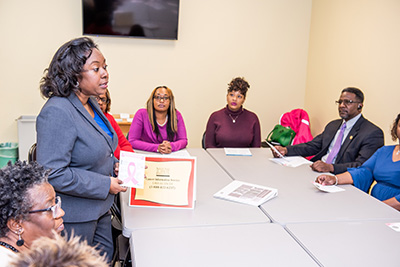Media contact: Beena Thannickal
 Delays in cancer screenings due to the coronavirus could lead to thousands of cancer deaths in the coming years. O’Neal Comprehensive Cancer Center at UAB is vigilant in its efforts to provide uninterrupted care to patients. Delayed cancer screening and testing during the novel coronavirus pandemic could bring dire consequences and roll back significant gains made in recent years in reducing cancer deaths.
Delays in cancer screenings due to the coronavirus could lead to thousands of cancer deaths in the coming years. O’Neal Comprehensive Cancer Center at UAB is vigilant in its efforts to provide uninterrupted care to patients. Delayed cancer screening and testing during the novel coronavirus pandemic could bring dire consequences and roll back significant gains made in recent years in reducing cancer deaths.
“As we continue our vigilance in the fight against the coronavirus, we must also remain mindful of other essential health services, such as cancer screenings and cancer treatments,” said Barry Sleckman, M.D., Ph.D., director of the O’Neal Comprehensive Cancer Center at the University of Alabama at Birmingham. “Failure to do so could bring significant consequences for those with cancer and compound health disparities and the ill effects of the pandemic.”
Cancer deaths in the United States have decreased over the last two decades primarily due to the effectiveness of screening procedures. These procedures detect cancer at its earliest stages, allowing for cancer treatments that are curative or more effective in cancer control when started early in the disease progression.
The recent coronavirus pandemic has prevented patients from undergoing much needed screenings and hindered access to these procedures that could result in late-stage presentations and cancer death.
National trends showing a dramatic reduction in cancer screenings and participation in clinical trials since the start of the pandemic are alarming. Additionally, recent statistics and estimates from the National Cancer Institute illustrate a grim scenario if action is not taken to address reduced and delayed medical care in the age of COVID-19.
NCI modeling on cancer screening and treatment solely for breast and colorectal cancer over the next decade suggests nearly 10,000 additional deaths. NCI estimates that the number of additional deaths could peak even higher, cutting through all cancer types.
 Barry Sleckman, M.D., Ph.D.“Even a short-term delay in screening and care can lead to more deaths,” Sleckman said. “A missed diagnosis of cancer now can pose a bigger problem later if it progresses to a later stage, leading to a worse prognosis.”
Barry Sleckman, M.D., Ph.D.“Even a short-term delay in screening and care can lead to more deaths,” Sleckman said. “A missed diagnosis of cancer now can pose a bigger problem later if it progresses to a later stage, leading to a worse prognosis.”
While there has always been a commitment to provide uninterrupted cancer care, the O’Neal Cancer Center is also attuned to the development of needed therapies that result from continuous research efforts.
“During this period, we are also closely monitoring our clinical trials to make sure that patients on trials receive uninterrupted treatment and to keep as many potentially lifesaving trials open as we can do safely,” Sleckman said. “I am happy to say that we have been able to successfully do this due to the strong commitment of our physicians, health care workers and staff. We owe a lot to them, and our patients have benefited greatly.”
Some cancer treatments can safely be delayed, while others simply cannot.
“We urge patients to continue to undergo age-appropriate cancer screenings and reach out to their health care providers regarding options,” said Monica Baskin, Ph.D., professor in UAB’s Division of Preventive Medicine and associate director for the Cancer Center’s Office for Outreach and Engagement. “The risk of missing cancer treatments or medical appointments must rightfully be weighed against the need to protect against potential COVID-19 exposure. These are discussions that patients should have directly with their health care provider to receive individual guidance.”
Even at the pinnacle of the pandemic, the O’Neal Cancer Center has been providing efficient and optimal patient care with new safety protocols in place.
“Additionally, our community outreach and engagement efforts are ongoing as we reach underrepresented and vulnerable populations,” Baskin said. “We are vigilant and are utilizing creative strategies during this rapidly evolving situation so that everyone in the communities we serve can safely still get the care they need.”
The O’Neal Cancer Center’s staff and community health advisers throughout the state remain on duty in their home counties to provide up-to-date information about ongoing initiatives and developments regarding COVID-19 and cancer prevention and screening.
 Monica Baskin, Ph.D., associate director for the Office of Community Outreach and Engagement at the O'Neal Comprehensive Cancer Center provides community health advisers with resources to promote timely screenings in their own communities.“It is more important than ever to provide our outreach team, who usually work physically in the communities they serve, especially in rural communities, with accurate information to help combat misinformation and complacency,” Baskin said.
Monica Baskin, Ph.D., associate director for the Office of Community Outreach and Engagement at the O'Neal Comprehensive Cancer Center provides community health advisers with resources to promote timely screenings in their own communities.“It is more important than ever to provide our outreach team, who usually work physically in the communities they serve, especially in rural communities, with accurate information to help combat misinformation and complacency,” Baskin said.
Sleckman recognizes the consequences of a toxic combination that could exacerbate conditions and impede significant gains in the fight against cancer.
“It is important to meet every patient right where they are in the cancer continuum of prevention, diagnosis, treatment or survivorship,” he said. “No matter how simple or complex the cancer and no matter how complicated the current public health situation, our doors remain open.”
UAB Medicine has always followed strict guidelines for cleaning; but it has also taken numerous steps to help prevent the spread of coronavirus, including special cleaning measures and practicing social distancing throughout its operations. Patients, visitors and staff are required to wear masks, practice appropriate hand hygiene and comply with entrance screenings.
“We are doing everything possible to keep our patients safe,” Sleckman said. “We understand the importance of getting the best care when you need it most.”